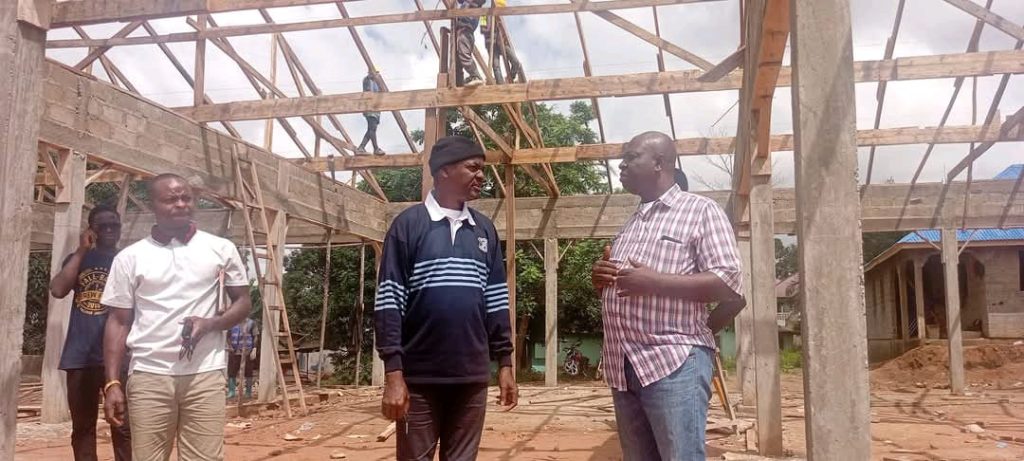Paragraph 1: The Genesis of the Land Dispute
A simmering land dispute in Bong County, Liberia, threatens to derail the construction of the much-anticipated Lelekpayea Community Market. At the heart of the controversy is a disagreement between landowner Orando Zarwolo and Bong County District #2 Representative James Kolleh over an alleged unpaid land agreement. Zarwolo asserts that Representative Kolleh committed to paying him USD 10,000 for the land upon which the market is being built. This promise, according to Zarwolo, was contingent on a $50,000 budget allocation specifically designated for the market project during the Bong County Emergency Development Sitting. With construction now underway and no payment forthcoming, Zarwolo has voiced his frustration and threatened legal action against Representative Kolleh.
Paragraph 2: Zarwolo’s Claims and the County’s Response
Zarwolo maintains that he was personally assured by Representative Kolleh that the payment would be made as soon as the groundbreaking ceremony for the market took place. Despite the ceremony having passed and construction progressing under the Saikei Group of Companies, led by Cooper S. Korlah, Zarwolo insists he has not received any compensation. He views the ongoing construction on his land without payment as a violation of both ethical principles and legal protocols. In response to the escalating tension, County Administrative Officer Samuel Elliott Sr. has committed to investigating the situation and providing clarity on the County’s official position regarding the allocation of the $50,000.
Paragraph 3: Conflicting Accounts and Lack of Communication
Adding another layer of complexity to the dispute, County Finance Officer Silas Tokpah stated that while the market project was initiated by the District #2 Commissioner, the county leadership was not formally notified that the land in question was privately owned. They operated under the assumption that the land had already been secured for public use. This revelation underscores a critical communication breakdown between the involved parties. Tokpah has pledged to collaborate with Superintendent Loleyah Hawa Norris and all stakeholders to ensure a fair resolution for the landowner and an amicable settlement of the dispute. This commitment highlights the county’s desire to address the issue and prevent further escalation.
Paragraph 4: Community Concerns and Zarwolo’s Ultimatum
As the controversy unfolds, anxieties are mounting among community members regarding the potential disruption of the market project. The market is seen as a crucial development initiative that would stimulate local trade and provide a central commercial hub for the residents of Lelekpayea and surrounding areas. The uncertainty surrounding the land dispute casts a shadow over the project’s future and raises concerns about potential delays or even a complete halt to construction. While Zarwolo has not specified a timeline for filing a lawsuit, he remains resolute in his intention to pursue legal action if the agreed-upon sum is not paid. He emphasizes that his concern is not with development itself, but with the manner in which it is being conducted.
Paragraph 5: The Principle of Fair Compensation in Development
Zarwolo’s stance underscores a fundamental principle in development: that progress should not come at the expense of individual land rights. He argues that it is unjust to proceed with a project on private property without providing proper compensation to the rightful owner. This principle resonates with broader concerns about equitable development practices and the importance of respecting land ownership, particularly in contexts where land holds significant cultural and economic value for communities. The dispute in Lelekpayea highlights the need for transparent communication, due diligence in land acquisition processes, and adherence to agreements made with landowners.
Paragraph 6: The Search for Resolution and Kolleh’s Silence
The ongoing dispute over the Lelekpayea Community Market land highlights the complexities of development projects and the potential for conflict when communication and transparency are lacking. The conflicting accounts, coupled with Representative Kolleh’s unavailability for comment, create a challenging environment for finding a swift resolution. The county leadership’s commitment to mediating the situation offers a glimmer of hope for a positive outcome. However, the success of this mediation hinges on open communication, a willingness to compromise, and a commitment from all parties to prioritize the interests of the community and the project itself. The silence from Representative Kolleh, a key figure in this dispute, adds an element of uncertainty and further complicates the path towards a resolution. His response, when and if it comes, will be crucial in shaping the future of the market project and the broader conversation about land rights and development in Bong County.














